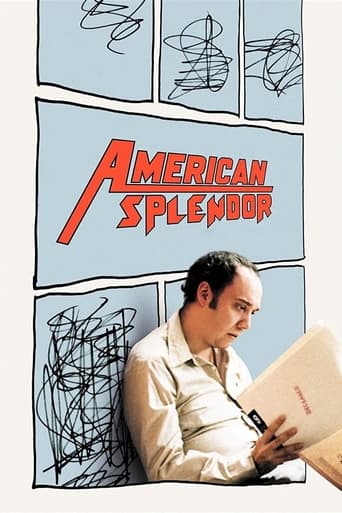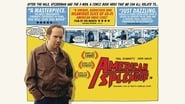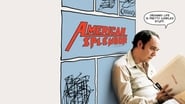Lee Eisenberg
I had never heard of Harvey Pekar or his work before "American Splendor" got released. Now that I've seen the movie, I'm impressed. The movie makes clear that Pekar (Paul Giamatti) didn't want to condescend to his audience. He just wanted to show life as it was. No sugar-coating, just the truth. As is often the cast with great artists, misery made for some fine work. An unusual trick that the movie uses is to intersperse footage of the real Pekar talking about why he created the cartoons that he did. He had some good things to say.Basically, this is what movies should be. It should go without saying that Giamatti does a perfect job as Pekar. Equal credit should go to Hope Davis as a fan whom he marries, as well as some other cast members (you gotta love what Pekar's friend says about "Revenge of the Nerds"). I'd also like to see the other movies directed by Shari Springer Berman and Robert Pulcini. Definitely see it.Watch for a young Josh Hutcherson as the boy dressed as Robin.
museumofdave
There was a time when Hollywood made biopics about people of accomplishment, films commending excellence, whether Marie Curie or Gandhi or Abraham Lincoln, good films modeling behavior worthy of emulation; I suppose this film about a curmudgeonly, unkempt sad-sack is perfect for the age of A Divided Nation; Harney Pekar is famous for being himself, living in his own private bubble, as if that were in itself worthy of public deification. That said, this is a brilliantly made film, with remarkable performances from Paul Giamatti and Hope Davis, and the sincerity of the filmmakers cannot be doubted. It is an amazing blend of cartoon, both human and drawn, combined with actual vintage television footage, the real Pekar frequently juxtaposed against both his cartoon self and Giamattis remarkable recreation. After a few hours, however, I had to question if I really found this guy worthy of anything other than a clever ability to market his failings; its remarkably made, but do I want this dude in my living room for two hours?
hettin03
In American Splendor, the theme is on the character with a focus on the plot. The main character is Harvey Pekar. He works as a file clerk at the VA Hospital in Cleveland, Ohio. His third wife, Joyce, is a minor main character. The real Harvey Pekar does voice overs and makes occasional appearances throughout the movie.This is a real life film about Harvey. The events of his life start at around age 10 when he is shown trick or treating with his friends. Everyone is in costume except Harvey. The person handing out candy at one house asks what character Harvey is dressed as. Well, Harvey is dressed as himself. This is character enough. The movie tells the story of how Harvey started his own comic book series. He decided to write comic sequences illustrating his everyday, mundane life. In an early scene, we see Harvey coming home after a doctor visit and finds his second wife packing up to leave him. At this point, things in Harvey's life start to really go down hill.After this, he finds himself dateless and lonely. And, it's no wonder. Harvey is so frumpy looking and walks around with his head down and shoulders bent as though he has a big chip on his shoulders.One day, Harvey is at a yard sale looking for that quarter priced bargain. He runs into a friend that introduces him to a well known comic book writer, Robert Crumb. Robert and Harvey become fast friends and start hanging out together, listening to music, with Harvey reading and Robert drawing characters for his comics.After a few scenes, Harvey is at the grocery store and is waiting in line to check out. He is held up by a lady who is arguing with the store manager over a price of one of her items. This is when Harvey gets his brilliant idea to write comics about his everyday life. Of course, the characters he draws are all stick figures. Because Harvey can't draw, he'll need to find someone to do this for him.We then see Harvey at home, working all night on this idea of his. Morning comes and it's time to go to work. He decides to take the material he has been working on with him so he can get the opinions of his coworkers. They all agree what Harvey has created is good. He then takes his work to his comic book friend, Robert, who also approves of Harvey's writing. Robert takes the material to have it published.Harvey then meets a girl, Joyce, a comic book enthusiast who works at a comic book store on the east coast. She can't find Harvey's latest issue so she decides to write him a letter to request a copy of his latest edition. Harvey calls her and they begin a telephone relationship. Joyce decides to visit Harvey. She moves in with him and they get married.Everything that portrays Harvey is depressing. The lighting and lack of color contribute to this depressed feeling that Harvey has. It's like a dark cloud follows him wherever he goes. In fact, Harvey is a very depressing person. It's written all over him. Everything is dull and drab. His clothes, apartment and even the areas of town he walks around in are colorless.Something else that contributes to Harvey's character is the repetitive idea of how things don't seem to go his way. He feels things should happen without any effort on his part. We see this idea repeated in several scenes where Harvey is walking around in a depressing part of town with his hands in his pockets and a scowl on his face. His apartment is depressing with junk, books and dirty dishes laying all around. And, we see Harvey always laying around, listening to music and reading. To me, these scenes convey how Harvey looks and feels about life, his life.His wife, Joyce, is depressing, too. She never smiles, nor does she show much expression. Even Joyce lays around in bed all day. So, we see this depressing pattern throughout the movie.Another movie I've seen that's based on the character is Citizen Kane. We watch how Charles Foster Kane, the main character, builds his newspaper empire. In American Splendor, we see how Harvey builds his comic book business. Although Harvey's business isn't what you would call an empire, it is something he has created. Both movies are built on the character's life.I like movies where the theme is about a person and their life. Especially, when it's a true story. It's very interesting to see the lives of others and watch how they grow into the person they are. Even though the title of this movie is the name of Harvey's comic book series, the comic book represents the main character and the writer, which is the theme of this movie.
calvinnme
This is really a great film about Harvey Pekar, the underground comic book writer who created the comic book series "American Splendor". I'm surprised this movie hasn't garnered more critical attention than it has. The movie basically takes you from the end of Harvey's second marriage up to the point of his retirement as a file clerk. Pekar is living a life of quiet desperation - everything in his life is generic. The film lends a dingy quality to Pekar's surroundings that really gives it that "garage sale" look right down to the light fixtures in his apartment. Even the supermarkets and restaurants Harvey frequent make K-mart look classy. Unlike his friends and coworkers though, he is painfully aware of the reality of his life. He has a moment of clarity one day while waiting in line at the grocery store behind a woman who is arguing over why she should pay 1.50 for six glasses that are marked two dollars, when he thinks of a way to strike out at all of this - he decides to document his feelings in a comic. Unfortunately, Harvey can't draw. He comes up with the narrative, but is only able to show stick figures as the actual characters in the drawings. Harvey's big break is that he has become friends with underground comic Robert Crumb before Crumb was famous and the two were just a couple of "ordinary" guys looking for bargains at Cleveland rummage sales. Crumb is impressed with the statement Harvey is trying to make and agrees to do the illustrations, thus the comic "American Splendor" is born.To me, the best part of this movie is the love story between Harvey and his third wife Joyce. These two people are just weird enough to make it work. What makes it work is that they have staked out their own individual claims to different enough territories in the land of weird that their respective neuroses don't bump into one another too badly, as had happened in Harvey's past marriages. Harvey is a man who has very un-mundane statements to make about his mundane world, but doesn't have any real illusions about changing it. Joyce is a self-diagnosed depressed anemic who has memorized the DSM 3 and is therefore happy to diagnose people with personality disorders and then pretty much takes them as she finds them, in spite of her claims of being a reformer. Because neither one wants to change the other, the relationship works.The film is really cleverly done, with comic book illustrations showing what Pekar is thinking in various situations along with narration and a couple of interviews with the actual Pekar and his wife interspersed throughout the film giving it a real feeling of authenticity. Paul Giamatti is simply marvelous as the caustic "warts and more" Harvey Pekar. How often do you see an actor share the screen with the person he is playing, as happens in this film, and not even notice a blip in continuity? His performance is that good. Giamatti certainly deserves better than playing supporting roles in films like "Big Fat Liar". Kudos also to James Urbaniak for his small role as artist and illustrator Robert Crumb. For the small amount of time he is on the screen he really captures the essence of the guy.






